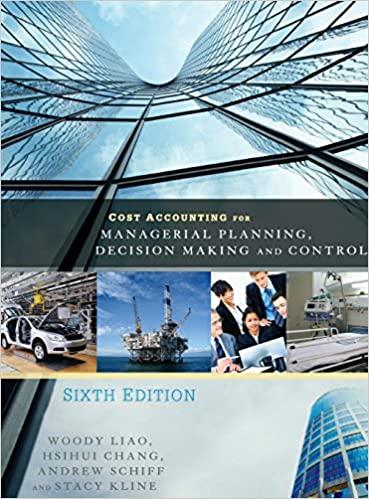Answered step by step
Verified Expert Solution
Question
1 Approved Answer
Thank you very much ! One type of machine can make parts E13, F14 and D15. As in the course exercise, the machines alternate successively
Thank you very much ! 
One type of machine can make parts E13, F14 and D15. As in the course exercise, the machines alternate successively between the various productions (e.g.: a batch of E13 then. F14, then D15, then E13, etc.). These automatic machines operate continuously during the workshop opening hours, which are Arganised as follows: 46 weeks per year, 5 days per week, organised in 3*8 (3*8=24 h/day). The necessary number of employees will be allocated over this period (the labour resource is not critical) To take into account various disturbances and hazards, you must plan for a capacity reserve of 1296 Parts Annual T Change applicatio Series ((h) Batch size T of treatment per piece (in h) n E13 51 920 2.5 472 0,09 F14 36 960 1.5 336 0,18 D15 44 990 3 409 0,11 Attention: do not confuse batch size (number of items in a batch and number of batches to be made per year) 1/What is the capacity (in hours) provided by each machine? (Whole number of hours, rounded to the nearest whole number) - Answer: - Calculation : 2/ What is the workload for the coming year (number of hours)? (Whole number of hours, rounded up) - Answer: - Calculation : 3/ How many machines are needed to ensure production (whole number) (Integer number of machines) Answer: Calculation: 4/ What is the remaining overcapacity in hours with the proposed number of machines? (Whole number of hours, rounded to the nearest whole number) Answer: - Calculation : 5/ These machines are largely automated, but require regular human intervention. Knowing that an employee is in charge of 2 machines simultaneously (supplying, monitoring, checking products, ...) What is the total number of employees to be assigned to the teams of this workshop. (Whole number of employees) - Answer: Calculation : One type of machine can make parts E13, F14 and D15. As in the course exercise, the machines alternate successively between the various productions (e.g.: a batch of E13 then. F14, then D15, then E13, etc.). These automatic machines operate continuously during the workshop opening hours, which are Arganised as follows: 46 weeks per year, 5 days per week, organised in 3*8 (3*8=24 h/day). The necessary number of employees will be allocated over this period (the labour resource is not critical) To take into account various disturbances and hazards, you must plan for a capacity reserve of 1296 Parts Annual T Change applicatio Series ((h) Batch size T of treatment per piece (in h) n E13 51 920 2.5 472 0,09 F14 36 960 1.5 336 0,18 D15 44 990 3 409 0,11 Attention: do not confuse batch size (number of items in a batch and number of batches to be made per year) 1/What is the capacity (in hours) provided by each machine? (Whole number of hours, rounded to the nearest whole number) - Answer: - Calculation : 2/ What is the workload for the coming year (number of hours)? (Whole number of hours, rounded up) - Answer: - Calculation : 3/ How many machines are needed to ensure production (whole number) (Integer number of machines) Answer: Calculation: 4/ What is the remaining overcapacity in hours with the proposed number of machines? (Whole number of hours, rounded to the nearest whole number) Answer: - Calculation : 5/ These machines are largely automated, but require regular human intervention. Knowing that an employee is in charge of 2 machines simultaneously (supplying, monitoring, checking products, ...) What is the total number of employees to be assigned to the teams of this workshop. (Whole number of employees) - Answer: Calculation 
Step by Step Solution
There are 3 Steps involved in it
Step: 1

Get Instant Access to Expert-Tailored Solutions
See step-by-step solutions with expert insights and AI powered tools for academic success
Step: 2

Step: 3

Ace Your Homework with AI
Get the answers you need in no time with our AI-driven, step-by-step assistance
Get Started


